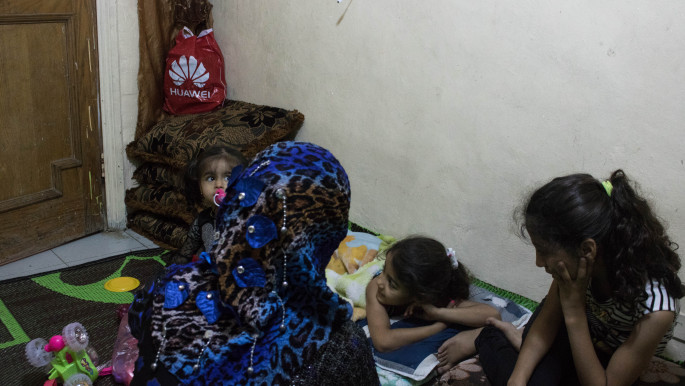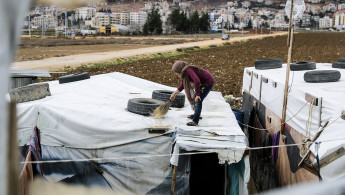Syrian refugees balance safety and hardship in Lebanon
Now she lives in a small apartment in Beirut with her five children with the hopes that they will have a better life and education.
"A year after the war started we were deliberating whether to come to Lebanon because the war was around Aleppo. Then it came to Aleppo, so we changed our mind," Amina begins.
"We walked for three days because the area that we lived in was controlled by Daesh [Islamic State group] and no one was allowed to go in or out.
"We then reached a point where we found vans and buses. We took a bus and came to Lebanon," Amina adds.
She tells The New Arab that they were not alone. "We were with other families."
Two days after Amina and her family left Aleppo, their house was bombed.
"I can't describe the feeling," she says. "There is a huge difference between the room that we live in here and the house that we used to live in in Syria."
Seeking a safe haven
The Syrian conflict began when the Baath regime, in power since 1963 and led by President Bashar al-Assad, responded with military force to peaceful protests demanding democratic reforms during the Arab Spring wave of uprisings, triggering an armed rebellion fuelled by mass defections from the Syrian army.
The brutal tactics pursued mainly by the regime, which have included the use of chemical weapons, sieges, mass executions and torture against civilians have led to war crimes investigations.
According to independent monitors, hundreds of thousands of civilians have been killed in the war, mostly by the regime and its powerful allies, and millions have been displaced both inside and outside of Syria.
Many Syrians opted to flee to neighbouring Lebanon as it was the closest safe haven.
 |
Lebanon, a country of four million, became host to an estimated 1.5 million Syrian refugees |  |
With an open-door policy, the country initially welcomed many with open arms, allowing refugees to enter without a visa and to renew residence cards almost free of charge.
But as the crisis in Syria continued to unfold, refugees came to make up almost a fifth of the population. Lebanon, a country of four million, became host to an estimated 1.5 million Syrian refugees – the largest per capita refugee population in the world.
Under local pressure, in January 2015 the Lebanese government passed rules that required Syrians to renew their residency permits with much stricter conditions. The new law inevitably rendered many illegal.
Today, an estimated 70 percent of refugees in Lebanon lack legal status, which among other problems limits their ability to work, access education and healthcare, or simply move freely without fear of being apprehended by police.
Read also: Desperate Syrians sell body organs in Lebanon to survive
Upon arriving in Lebanon, Amina found it challenging to find work and a place to live.
"It's very difficult to find a job here in Lebanon. This is why my son is working. If it was up to me I would work."
— Filippo Grandi (@RefugeesChief) June 20, 2018
|
Amina receives two types of assistance: multi-purpose cash assistance and a world food programme card. This card is used for her to buy food for her family and the cash is used to buy other necessities, such as medication or if she or her children have to visit a doctor.
Besides this aid, she does not receive any help from other organisations or any governments.
In order to help support her family, she works as a cleaner in exchange for housing. However, she is not paid any money for her work.
'Not the best life, but we are safe'
For Amina, life in Lebanon is difficult, but it is worth it because her children are safe and receiving an education.
"It's not the best life, but at least my children are around me, everyone is safe and all of them are in school. This is the most important thing for me."
She proudly adds that her "eldest daughter is the first in her class."
However, her eldest son works in a fruit and vegetable shop and has faced discrimination because he is a refugee.
"He used to get beaten sometimes in the street and he used to be harassed because he is working."
He was also told by some people that "the Syrians are taking the jobs from the Lebanese because they seek a low wage."
"At some point, he started needing psychological support," Amina explained, "because he couldn't handle the pressure. I went to talk to the owner of the shop that he works at, but he told me that if this is how things are, if he can't handle it, he can go back home."
 |
For Amina, life in Lebanon is difficult, but it is worth it because her children are safe and receiving an education |  |
According to Amina, the Lebanese government has refused to help the refugees and has been actively trying to prevent more from coming into the country.
"We haven't experienced anything from the [Lebanese] government. I don't believe that the Lebanese government helps refugees. Especially since the Lebanese government has been pushing for refugees to leave the country," Amina says.
"The Lebanese government is pushing people to 'safe' areas in Syria although they know that they are not safe areas."
She also added that in Jordan things are better because the government supports the refugees more and that larger countries, such as the United Stated and Europe need to do more to help.
"For sure the countries need to provide refugees with more assistance. They need to come and see the conditions that we live in because maybe I am better off than other refugees, but the conditions are still really, really heard.
"They need to come and see so that they can provide more assistance."
 |
|
| Amina lives in a small apartment in Beirut with her five children [Nicholas Frakes] |
For Amina, her children's education is the most important thing since she married at a young age and she was unable to finish her own education. Because of this, she is only willing to live in a place where her children can go to school.
"I am willing to stay here in Lebanon because I want my kids to get an education. I want to go back to Syria, but as long as there are schools in the area where we would move to. If there are not any schools, then I will not go back."
Amina's eldest daughter said that she wants to go to university when she gets older. She smiled widely as she explained that she wants to become a doctor in Lebanon.
 |
He started needing psychological support... because he couldn't handle the pressure. I went to talk to the owner of the shop that he works at, but he told me that if this is how things are, if he can't handle it, he can go back home |  |
Something else that Amina finds to be important is her children's lives in general and she wants them to have a better life without war.
"I wish that they will have better days," she said, "That they don't live in war. That they go back to Syria peacefully and that they get to know their grandparents and get to be happy."
Currently, Amina's parents are in camps back in Syria. She does not have any contact with them, but according to a smuggler that spoke with her, her parents are "doing fine".
She also has two brothers in a Scandinavian country, some relatives in Jordan and others in Turkey all of whom she keeps in contact with.
Amina stressed the importance for reporters to "portray the way of how the families are living."
"Not for me only," she explained, "but for other families because it is a really difficult situation. These voices are needed to advocate for the refugees. We need the voices of other people."
*Some names have been changed or omitted for the safety and the security of the family.
Nicholas Frakes is a freelance journalist that reports from London, the Middle East and North Africa.
Follow him on Twitter: @nic_frakes



